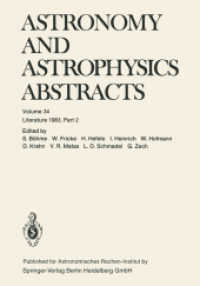- ホーム
- > 洋書
- > ドイツ書
- > Mathematics, Sciences & Technology
- > Chemistry
- > organic chemistry
Description
(Text)
Master's Thesis from the year 2016 in the subject Chemistry - Bio-chemistry, grade: 1,7, Free University of Berlin, course: Biochemie, language: English, abstract: The CRISPR-Cas system derived from bacteria and archaea adaptive immune system is a high potential method for fast genome editing that promises to revolutionize previous genome engineering. It is based on the specific targeted induced double strand break by an endonuclease. In elapsed studies PA28Gamma figured out as an important key molecule involved in cell cycle regulation, cell signaling transcription, immune response and apoptosis. Recent investigations showed p53 to be a target of PA28Gamma enhanced ubiquitination via MDM2 and subsequent proteasomal degradation. Otherwise mutant p53 (R248Q) has been shown as suppressor of the REGGamma promotor. This study aimed the CRISPR-Cas mediated gene knockout of PSME3 and tp53 in Caspase3 lacking MCF-7 breast cancer cells to investigate apoptosis. A user-developed protocol was established to implement the Multiplex CRISPR/Cas9 Assembly System Kit and the alone standing pSpCas9(BB)-2A-GFP plasmid provided by Takashi Yamamoto and Feng Zhang (Ran et al. 2013, Sakuma et al. 2014) for the generation of knockout cells.The cloning of gRNA harboring plasmids targeting PSME3 exon1/exon4 as well as tp53 exon1_1/exon1_2 was fast and in a high efficient fashion but a verification of the final constructs via T7 Endonuclease I assay was not possible. Interestingly, using fluorescent microscopy different gRNAs cloned in the CRISPR plasmids revealed variant apparent transfection efficiencies or GFP plasmid or protein stability. Furthermore, PA28Gamma targeted cells showed a better survival than p53 knockout cells. Therefore, also no tp53 targeted cells survived the serial dilution and clonal selection over an eight week period. PSME3 exon1_F1, exon4_C8 and exon4_B9 revealed PA28Gamma levels of about 50% compared to the untransfected wild type cells in Western Blot analyses. This could be caused by a heterozygous knockout of the PSME3 gene on chromosome17. One single cell clone (PSME3 exon4_F9) maybe carrying a gain of the PSME3 gene, undergoing interchromosomal recombination or only was hidden at one allele by the Cas9 enzyme showed 75% for PA28Gamma levels. In summary CRISPR-Cas enabled us probable to modify the PSME3 and tp53 gene in MCF-7 cells resulting in altered survivals of the transfected cells. Additionally, first investigations of the new established MCF-7 PSME3 knockout cell lines considering the PA28Gamma protein level showed a successful 50% reduction. It was not possible to study any apoptosis related behavior.








